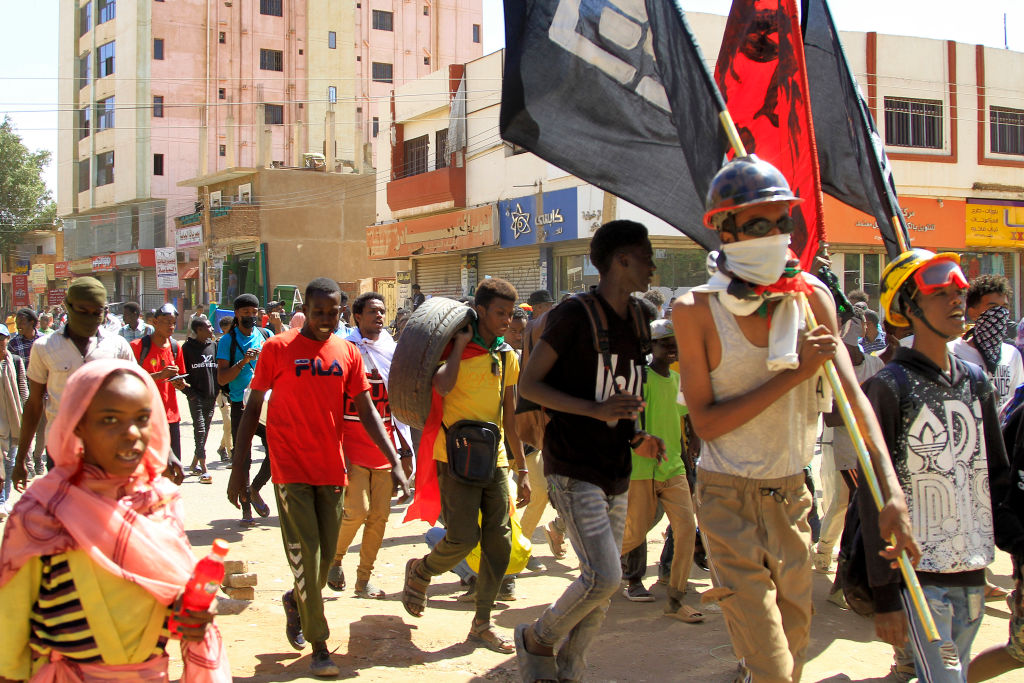ADF STAFF
Despite months of discussions aimed at returning Sudan’s government to civilian control after the October 2021 military coup, Sudanese citizens remain skeptical that anything will change soon.
“The vast majority of Sudanese people, particularly in the streets, have little to no trust in the military and other actors in the political process,” Hamid Khalafallah, a nonresident fellow at the Tahrir Institute for Middle East Policy (TIMEP), told ADF via email.
That distrust has been earned, Khalafallah said, because the transition is being led by the same men — Gen. Abdelfattah al-Burhan and Gen. Mohamed Hamdan Dagalo (widely known as Hemedti) — who led the 2021 coup. The transition has, so far, done little to change the generals’ pre-coup powers, he added.
“There are no guarantees they would commit to the new agreement and not plan another coup in the future,” Khalafallah said.
Given that the groups negotiating the transition agreement have little popular support, the final agreement is not likely to have much popular support, he added.
“The new government will face a serious legitimacy question,” Khalafallah said.
Soon after the 2021 coup, al-Burhan and Hemedti realized that they were not capable of running the country, Khalafallah told The Africa Report.
The coup prompted international donors to withhold billions of dollars the country’s annual budget depended on. The economic tailspin that followed added to the strains already created by post-pandemic inflation and food shortages caused by the Russian invasion of Ukraine.
Since the coup, demonstrators have gone into Khartoum’s streets to protest the junta. Security forces have killed at least 100 protesters since October 2021. Hundreds of others have disappeared, been detained and been assaulted by security forces, according to Human Rights Watch.
The groups negotiating the transition missed their planned April 1 deadline for signing the deal as al-Burhan and Hemedti failed to reach their own agreement for integrating Hemedti’s Rapid Support Forces (RSF) into the Sudan Armed Forces (SAF) run by al-Burhan.
The RSF and Hemedti have developed close military and economic ties with Russia and its Wagner Group mercenaries. The RSF and Wagner operate gold mines that pump money into the pockets of Hemedti and those close to him and also finance Russia’s invasion of Ukraine.
“The more empowered the RSF is by Russia and other actors, the more they will act as spoilers to the democratic transition in Sudan and to security in the whole region,” Khalafallah told ADF.
Parallel to the RSF’s economic and military alliances, the SAF has its own deep ties throughout Sudan’s economy. Everything from farms to oil fields to weapons manufacturing pumps money back into the Sudanese military, making it financially and politically independent from civilian control.
The economic interests of the SAF and RSF mean the men who lead them are unlikely to inspire confidence in the public, according to Ahmed Ismat, a spokesperson for the Khartoum Resistance Committee. The men also have the blood of dead protesters on their hands, he added.
“People are protesting the formation of a new government, and they will continue to do so as long as Burhan and … [Hemedti] are involved in the process,” Ismat told The Africa Report.
The 2021 coup happened as civilian partners in the Sovereign Council were about to take power with the promise to investigate the military’s extensive reach into all corners of Sudan’s economy.
The Sovereign Council was established after the overthrow of former dictator Omar al-Bashir and made up of military and civilian leaders. After leading the council for the first half of its planned 36-month term, al-Burhan arrested civilian leaders before they could take power.
Khalafallah expects little to change under the transitional government.
“SAF and RSF will certainly not accept civilian oversight over their institutions, and they are not even trying to hide it,” he told ADF. “On various occasions, military leaders stressed the fact that they will not accept civilian control over the military unless it’s an elected government. The transitional government will not be elected.”
Given the unpopularity of Sudan’s transition agreement, the uncertainty surrounding civilian control of its military, and the tensions between the SAF and RSF, Sudan’s road to democracy could be long and rocky, Khalafallah told ADF.
“Sudan’s transition will certainly struggle over the next few months and even years,” he said. “All these factors will affect the stability of the country’s transition unless properly resolved by civilians and the international community.”

